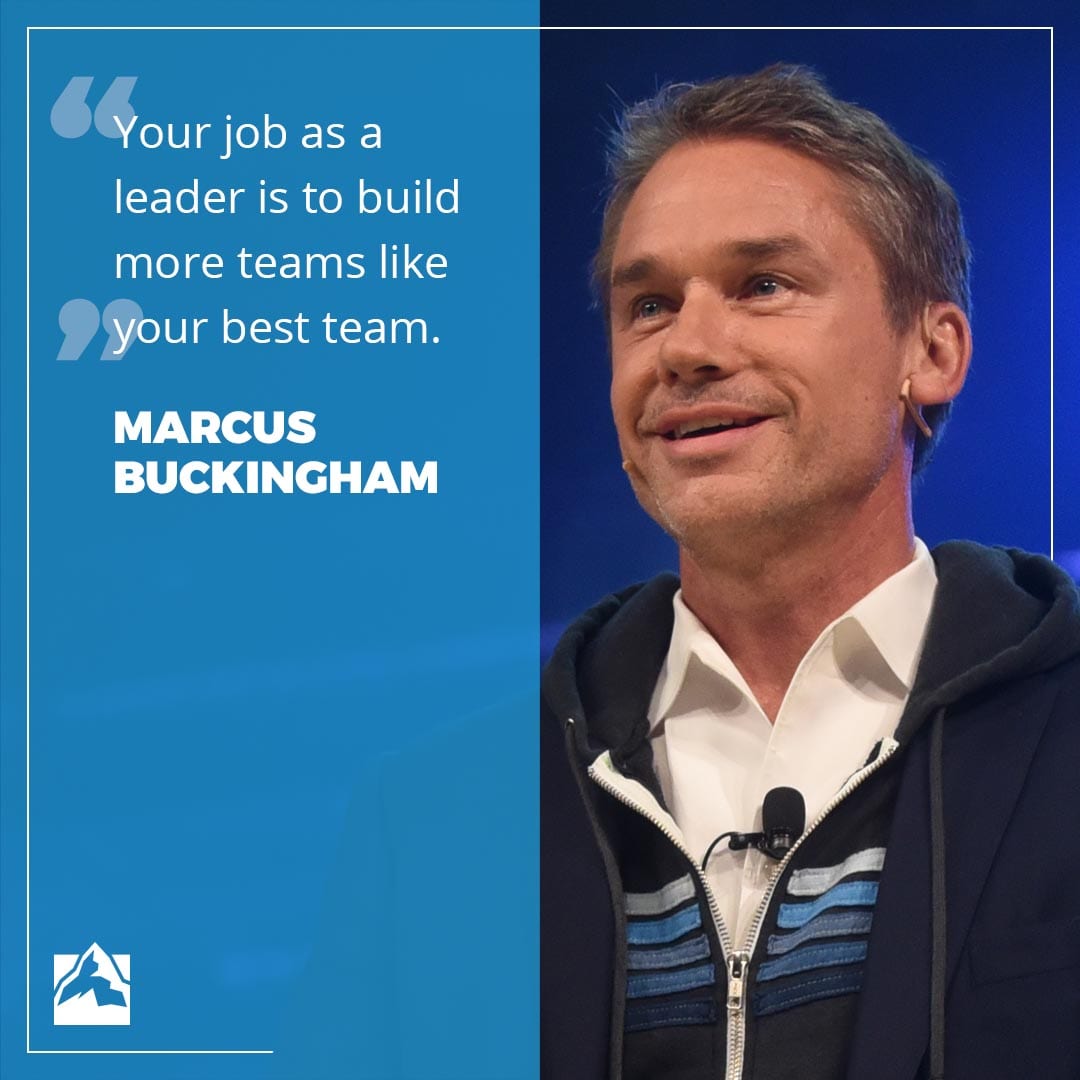
 Matt Blakely started a business called MB3 over a decade ago to help states recover from natural disasters. The software he developed now manages over $40 billion dollars in disaster grants. He used to describe himself as the typical, controlling CEO for the first ten years of running his business, but saw a radical turnaround in part due to what he learned at The Global Leadership Summit. Since then, he developed an obsession with setting others up for success. Matt took everything he learned and wrote a book called Empower Then Lead, which has a framework that he now teaches to others.
Matt Blakely started a business called MB3 over a decade ago to help states recover from natural disasters. The software he developed now manages over $40 billion dollars in disaster grants. He used to describe himself as the typical, controlling CEO for the first ten years of running his business, but saw a radical turnaround in part due to what he learned at The Global Leadership Summit. Since then, he developed an obsession with setting others up for success. Matt took everything he learned and wrote a book called Empower Then Lead, which has a framework that he now teaches to others.
Jumping into leadership
I started my company in my early 20s. It was 2004, and I was on vacation with my family in Florida. While we were there, I went to lunch with my friend Jason who worked in disaster recovery for the Florida state government. He told me about the devastation caused by a hurricane that had struck the Florida coast recently and the massive amount of paperwork the state would have to process, including an unprecedented number of requests for financial assistance to help communities rebuild. Working seven day weeks, 12 hours a day, the recovery team was worn out.
Jason seemed to be thinking out loud when he asked if I could help with some sort of software solution and offered to introduce me to Del, the person in charge of the recovery effort.
So there I was at 23, walking into Del’s office with no product to show, to ask for his trust on a long-shot idea. Miraculously, he said yes, which changed the trajectory of my life in a hurry. Overnight MB3 was born.
 I spent a week driving with Jason to the hardest-hit areas of the state, surveying the damage firsthand. I saw entire communities nearly wiped out, met with city and county officials and listened as Jason explained how the state was going to help with the recovery efforts. I not only learned about the problem, but also became passionate about finding a way to help get people’s lives back together.
I spent a week driving with Jason to the hardest-hit areas of the state, surveying the damage firsthand. I saw entire communities nearly wiped out, met with city and county officials and listened as Jason explained how the state was going to help with the recovery efforts. I not only learned about the problem, but also became passionate about finding a way to help get people’s lives back together.
Over a six-month period, I worked to build the product just fast enough to stay ahead of where the state was in the process. I joined the rest of the team, working inhumane hours, and became known as the kid who did magical stuff on my computer that saved the day.
I wasn’t ready for the software to transfer outside of Florida when Hurricane Katrina hit New Orleans and the surrounding areas, but that didn’t stop it from happening.
I hit the road again and spent the next six months working in Louisiana, Mississippi, and Alabama witnessing the devastation. I drove through communities where every single house had been devastated. Thousands of cars had been abandoned on the sides of roads, completely destroyed by floodwater and debris. Along the Mississippi coast, some places looked like a total war zone, even months after the disaster. On a road along the ocean I saw faded parking spot lines on pavement next to buildings that were no longer there—where people once lived and worked.
As with Florida, experiencing what clients went through was an incredible opportunity. But in this case, I saw a direct link between the software and the damage. Being so closely involved in the situation shaped both my life and everything MB3 would come to do afterwards.
Fast forward ten years, and the company has grown to having our software manage over $40 billion in 16 states, including recovery funds for hurricanes Harvey in Texas and Irma in Florida. We have an office in Canada and the United States, and a team of 20 people.
But there is a key transition between the story of how the company started and where we are now.
Hitting a wall, and attending The Summit
 A few years ago, I hit a wall in my business; I was desperate to expand, but I was so involved in the day-to-day tasks that I couldn’t seem to move forward. I began to realize that I was the bottleneck preventing growth.
A few years ago, I hit a wall in my business; I was desperate to expand, but I was so involved in the day-to-day tasks that I couldn’t seem to move forward. I began to realize that I was the bottleneck preventing growth.
Someone I respect told me to take a step back for a few weeks during the summer and just read. To me it sounded like a prison sentence, not because I disliked learning, but more because it meant pausing my life. But I did it. I read books like my job depended on it. And at the end of that summer, I attended The Global Leadership Summit. Empowerment was the uniform theme I believe God was revealing to me.
The main session that impacted me from the Summit that year was from Horst Schulze. He talked about personally sharing the vision with the entire team of new hotel locations he opened. I was challenged when he talked about caring for his team because it was simply the “right thing.” He also said, as leaders we forfeit the right to make excuses, which meant I had to take responsibility for not having a successful team.
I became convinced empowerment and others-focused leadership was the solution.
I committed to giving 100 percent to implement this new empowerment initiative. I spent the next 12 months obsessed with setting up my team for success and seeing them thrive. I switched my mindset to seeing my impact vicariously through others. Prior to this, I was the one in the spotlight, running the show, making all the big decisions and doing the important work. Now I was trying to make each person on my team the hero, while I played more of a supporting role, elevating others so they could shine. I saw my role as existing for the benefit of my team. If a bad decision was made, it was because I didn’t set them up to succeed.
This season of learning ended up being the catalyst for my book Empower Then Lead: Have a greater impact by setting up your team for success. The book contains everything I’ve learned about empowering leadership and the phenomenal results from these principles.
Engage people’s strengths
It starts by ensuring people are in roles where their strengths are leveraged. What you want are people in roles where they are far stronger than you, given the right environment. Ask yourself: How can I better maximize the skills of each person on my team?
Share what they need to know
Continually share what your team needs to know to be successful. For years, I made no effort to share what I knew and experienced in Florida and Louisiana in the early days. Until people understood the area in which they were working, how could I possibly expect my team to be empowered to do great work and make good decisions? My decisions would almost always be better, based solely on what I knew and the experiences I had. Ask yourself: What context do you need to share to empower people?
Hand over ownership
Now I can hand over responsibility with clear boundaries of what is owned and expectations for the outcome. The goal is to minimize the amount of decisions you make as a leader, and clearly define the areas where others are free to decide without you. Ask yourself: Where is ownership unclear and what do I need to hand off?
Support your team
As a leader of an empowered team, you still need to play a key supporting role in order to see maximum impact. You have to reinforce constantly the ownership you have handed out and the context that supports that authority. And you must be a mentor to the people on your team, holding people accountable to the outcomes they are responsible for. This means minimizing task-based distractions since your role is centered around setting up others. Ask yourself: What am I doing each day to set up my team for success?
I used to define “impact” as making more money and growing something, but now I see it as people.
Positively affecting people is now impact to me (and incidentally seems to help me achieve). Everybody knows it’s better and more fulfilling to do something for others instead of for yourself. Unfortunately, it’s not usually lived out in the business world and is rarely applied to leadership.
Empowerment — It’s how Jesus leads
I probably should have seen it sooner since this is exactly how Jesus lead. His name has lasted for centuries, yet from what the Bible says, Jesus worked with his team (his disciples) for only three years. He didn’t even travel that far around the world to share his cause. His game plan seemed to be empowering other people to spread the message.
He saw potential in everyone he encountered and always assumed success. He even told people they would do greater things than he did, which is not typically an attitude held by today’s leaders. The Bible says that Jesus came “not to be served but to serve others” (Mark 10:45 NLT). It also says, “In humility, value others above yourselves, not looking to your own interests, but each of you to the interests of the others” (Phil. 2:3–4 NIV). That’s exactly the example I want to follow.
You have to ask yourself what you want from your life. Do you just want to build an organization and make money, or do you also want to be a leader who makes a positive impact in the lives of the people around you? Setting other people up for success is truly rewarding leadership, where fulfillment comes from focusing on others first.











Recent Comments